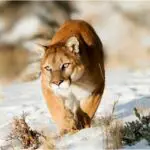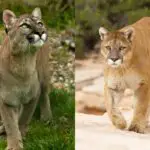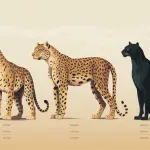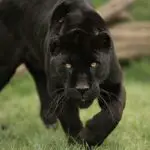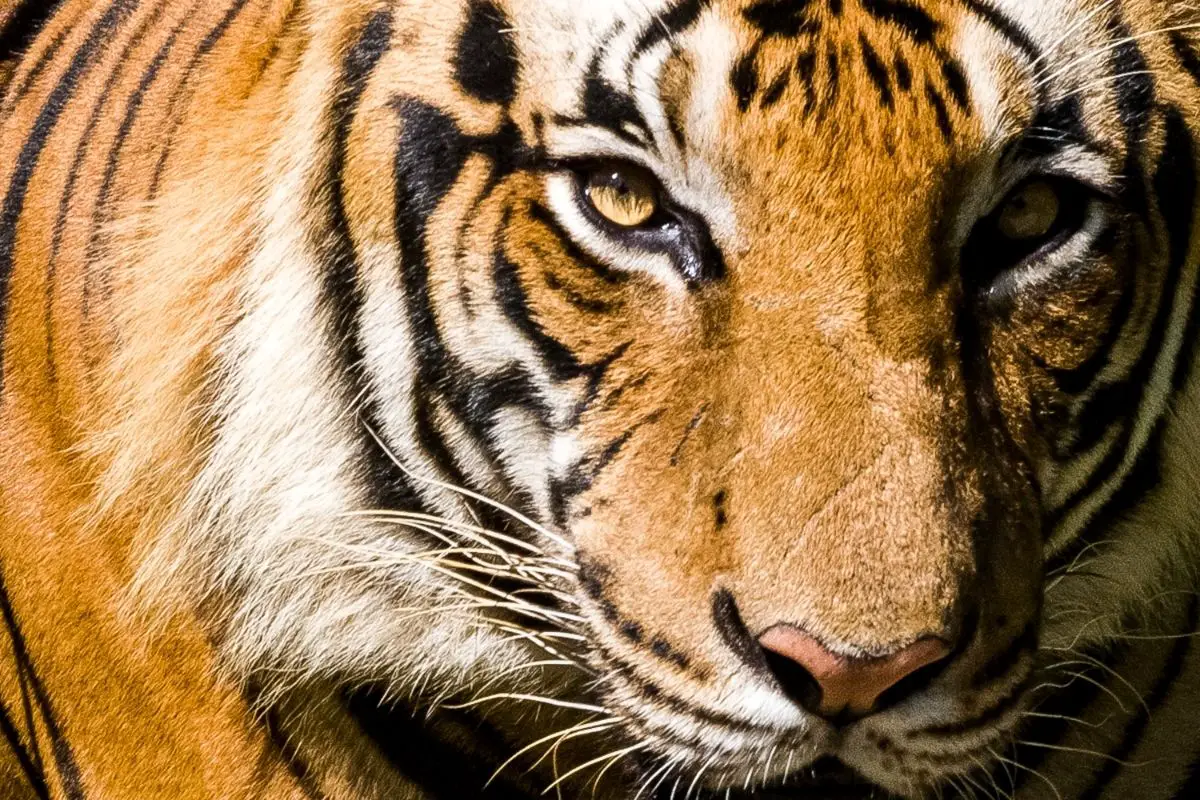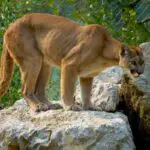The diet of a cougar, also known as a mountain lion or puma, is a fascinating aspect of their predatory lifestyle.
As one of North and South America’s most formidable predators, cougars have developed a dietary repertoire that reflects their adaptability and hunting prowess.
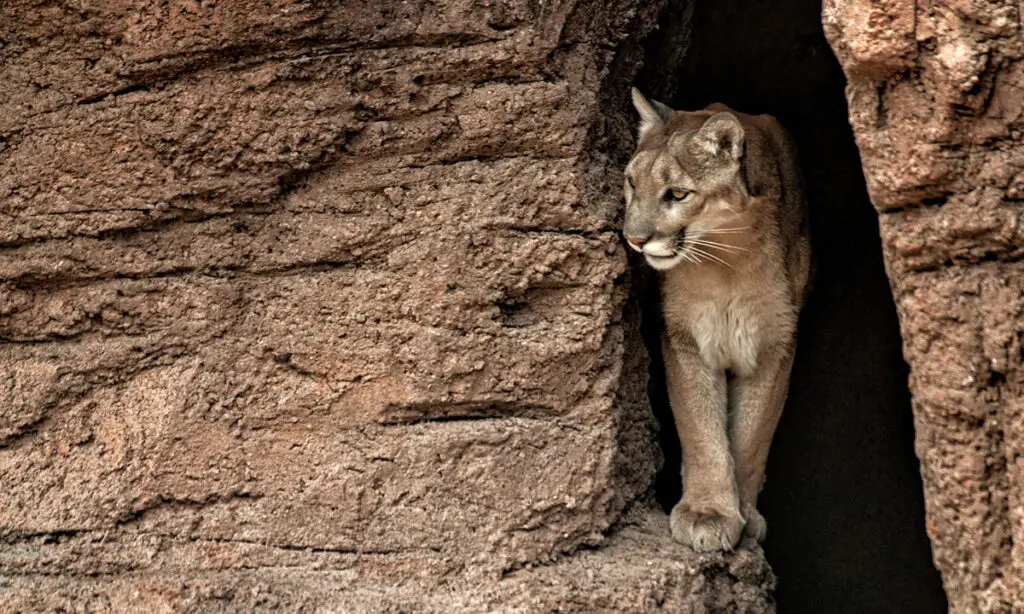
Diet of a Cougar
The diet of a cougar primarily consists of ungulates, which are hooved animals. Cougars are versatile hunters and have adapted to prey upon a wide range of ungulate species, depending on their geographic location and the availability of prey.
Among the ungulates, deer, especially mule deer (Odocoileus hemionus) and white-tailed deer (Odocoileus virginianus), are significant components of a cougar’s diet.
Deer make up a substantial portion of a cougar’s prey. Their adaptability allows them to pursue and capture different deer species across their habitats.
Cougars have evolved to effectively stalk and ambush deer, utilizing their agility and stealth to get within striking distance.
Once in range, cougars employ their powerful hind legs to leap and pounce on their unsuspecting prey, often targeting the neck or throat for a quick and lethal bite.
Cougars Are Food Flexible
However, the diet of a cougar is not limited to deer alone. These predators exhibit flexibility in their food choices, especially when specific prey species are scarce or unavailable.
Cougars have been observed hunting and consuming a variety of ungulates, including elk (Cervus canadensis), moose (Alces alces), and bighorn sheep (Ovis canadensis).
These larger ungulates can provide substantial nourishment for cougars when they can successfully take them down.
Additionally, cougars are not solely dependent on larger ungulates for sustenance. In times of scarcity or in areas with limited access to larger prey, cougars are capable of hunting smaller mammals to meet their dietary needs.
Rabbits, hares, and other small mammals are not uncommon in the diet of cougars. The ability to adapt their diet based on the availability of prey contributes to their survival and ecological success in diverse environments.
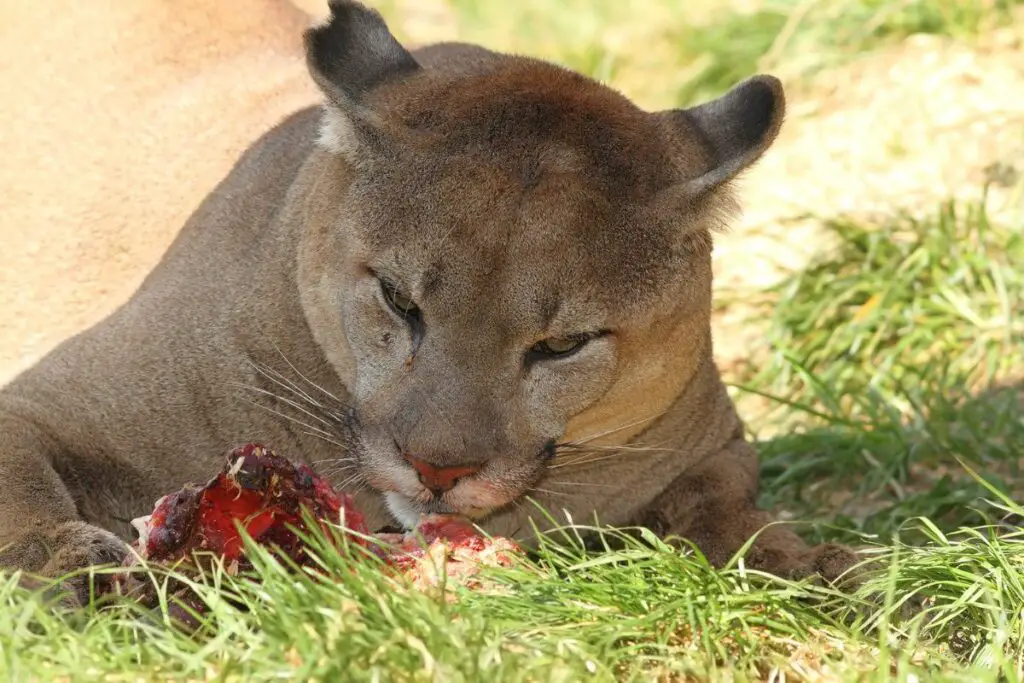
Other Factors
It is worth noting that the specific composition of a cougar’s diet may vary based on factors such as the region, habitat type, and the presence of alternative prey options.
For instance, in areas where deer populations are low, cougars may rely more heavily on alternative ungulate species or smaller mammals to fulfill their dietary requirements.
Understanding the diet of cougars is essential for wildlife management and conservation efforts.
By comprehending their prey preferences and the ecological relationships they have with their food sources, conservationists can make informed decisions regarding habitat conservation, prey management, and the overall conservation of cougar populations.
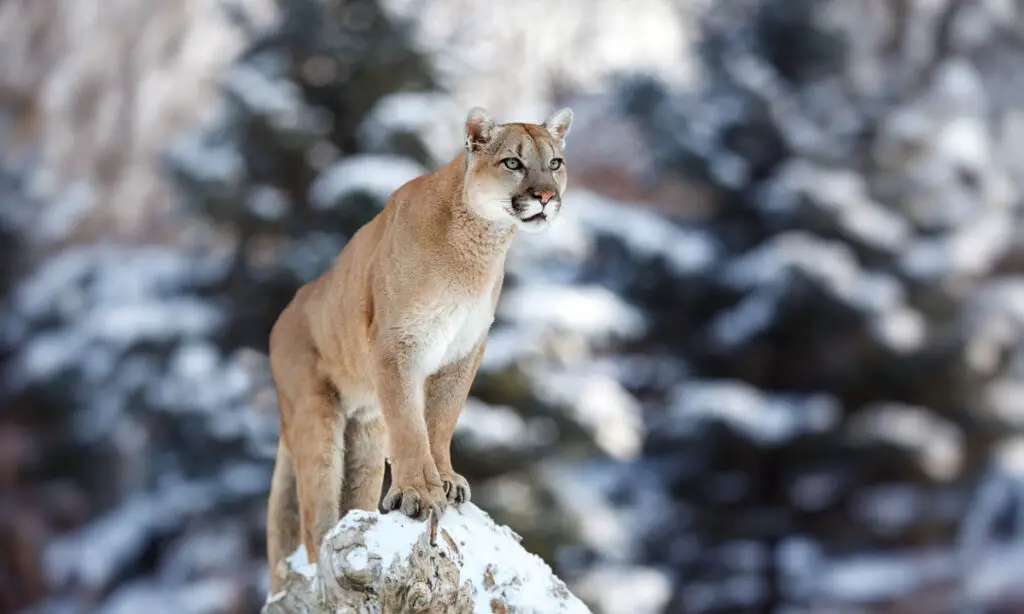
Hunting and Feeding Habits of Cougars:
Cougars, with their remarkable hunting skills and physical prowess, have evolved to become highly efficient solitary hunters.
Their survival in the wild depends on their ability to stealthily approach and capture their prey. Let’s take a closer look at the hunting and feeding habits of these fascinating predators.
Cougars rely on a combination of stealth, patience, and incredible athleticism to secure their meals. They are known for their ability to stalk their prey for extended periods, sometimes hours, patiently waiting for the perfect moment to strike.
With their keen senses of sight, hearing, and smell, cougars carefully observe their surroundings, analyzing the behavior and movements of their potential targets.
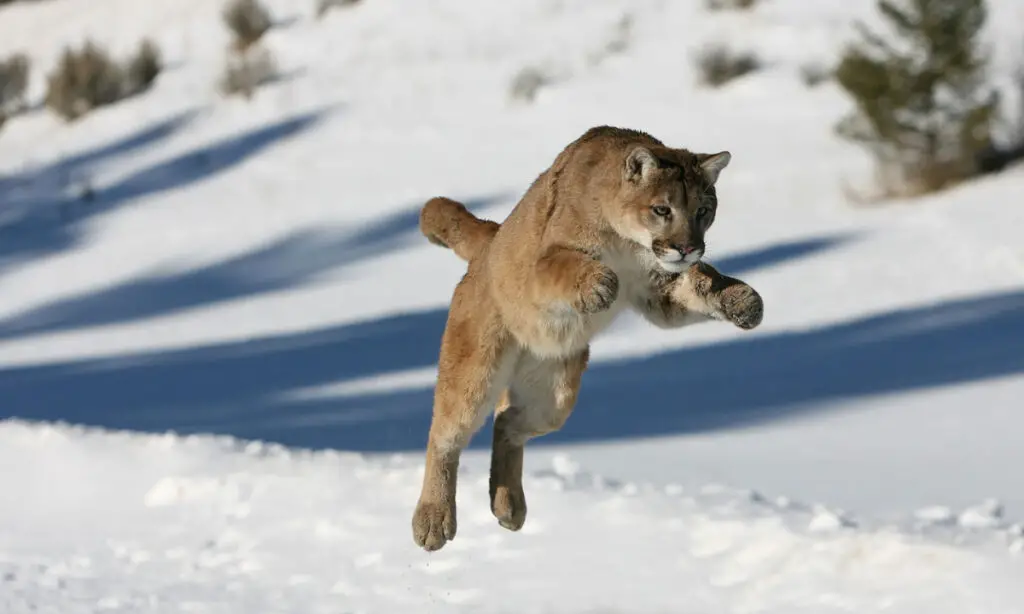
With Cougars: Speed Kills
When the time is right, cougars unleash their remarkable speed and agility. With their powerful hind legs, they can cover impressive distances in a single leap and pounce on their unsuspecting victims with astonishing precision.
The element of surprise is crucial to their hunting success. Cougars often aim to deliver a swift and fatal blow to their prey, targeting the neck or throat with a powerful bite that punctures vital organs or severs the spinal cord.
Once a cougar successfully captures its prey, it exhibits strength and determination in securing its meal. With their strong jaws and sharp teeth, they efficiently kill their prey and consume it.
After a successful hunt, cougars often drag their kill to a secluded spot, away from potential competitors and scavengers. They may cover the carcass partially with leaves, dirt, or snow to protect it from other animals and to preserve it for future meals.
In cases where the kill is larger than what they can consume in one feeding, cougars demonstrate an intriguing behavior known as caching.
They may bury or hide the remaining carcass, covering it to minimize exposure and deter scavengers. This caching behavior allows cougars to return to the kill over several days, feeding on it until it is fully consumed.
This strategy helps them maximize the efficiency of their hunting efforts and ensures a steady food source when prey availability is limited.
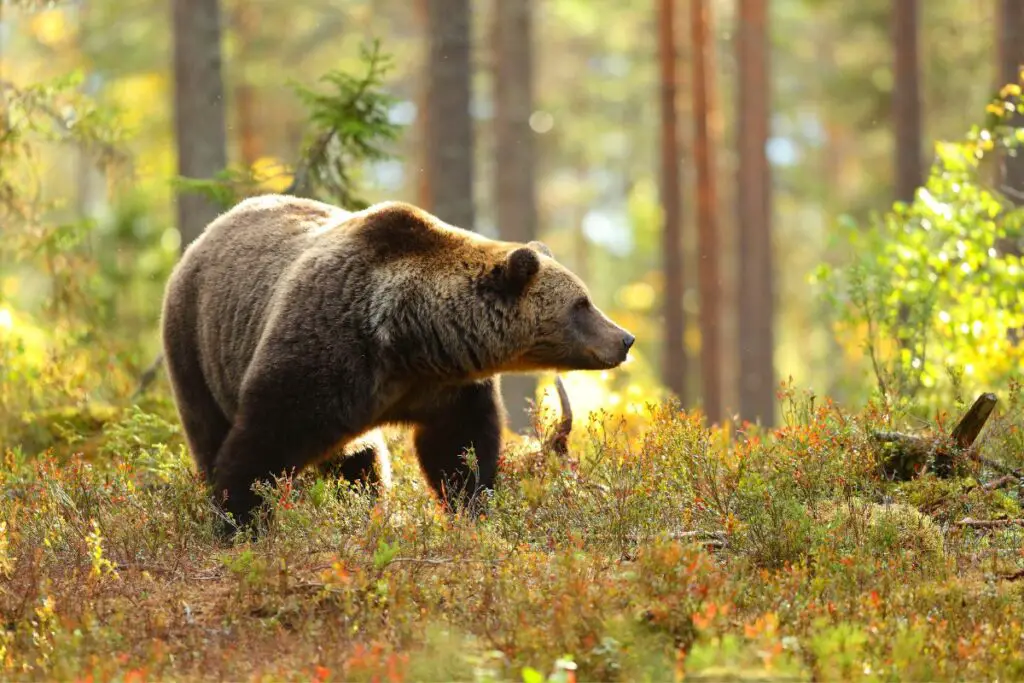
What Eats Cougars?
While cougars are apex predators and sit at the top of the food chain, they are not entirely free from threats. Although they generally have no natural predators, there are instances where they can fall victim to other large carnivores.
Bears, especially grizzly bears, and packs of wolves are among the few potential threats to cougars.
Encounters between cougars and these predators are relatively rare, as cougars are highly skilled at avoiding confrontations and prefer to retreat rather than engage in conflicts with potentially dangerous adversaries.
In conclusion, cougars are solitary hunters that rely on their stealth, patience, and athleticism to secure their prey. Their ability to stalk, pounce, and deliver a swift and decisive blow is a testament to their remarkable hunting skills.
Through their strength and agility, they secure their kills and employ caching strategies to ensure a steady food supply. While cougars generally have no natural predators, they are cautious creatures that prefer to avoid conflicts with other large carnivores.
Understanding the hunting and feeding habits of cougars is crucial for appreciating their role in ecosystems and developing effective conservation strategies to protect these magnificent predators.
What Does Cougar Eat?
I saw this question and figured id clarify. It’s not uncommon to come across the misspelling “couger” instead of “cougar” when referring to these magnificent predators.
However, it’s important to clarify that both “couger” and “cougar” refer to the same animal: Puma concolor, also known as mountain lion, puma, or panther. Therefore, the diet of a couger is identical to that of a cougar.
Final Bite
Cougars are solitary hunters that rely on their stealth, patience, and athleticism to secure their prey. Their ability to stalk, pounce, and deliver a swift and decisive blow is a testament to their remarkable hunting skills.
Through their strength and agility, they secure their kills and employ caching strategies to ensure a steady food supply. While cougars generally have no natural predators, they are cautious creatures that prefer to avoid conflicts with other large carnivores.
Understanding the hunting and feeding habits of cougars is crucial for appreciating their role in ecosystems and developing effective conservation strategies to protect these magnificent predators.
- Bengal Cat vs Wild Bengal Tiger: Complete Comparison 2025 - October 31, 2025
- Complete Wild Cat Spotting Guide for Hikers 2025 - October 31, 2025
- Lynx vs Bobcat: Complete Field Identification Guide 2025 - October 30, 2025

